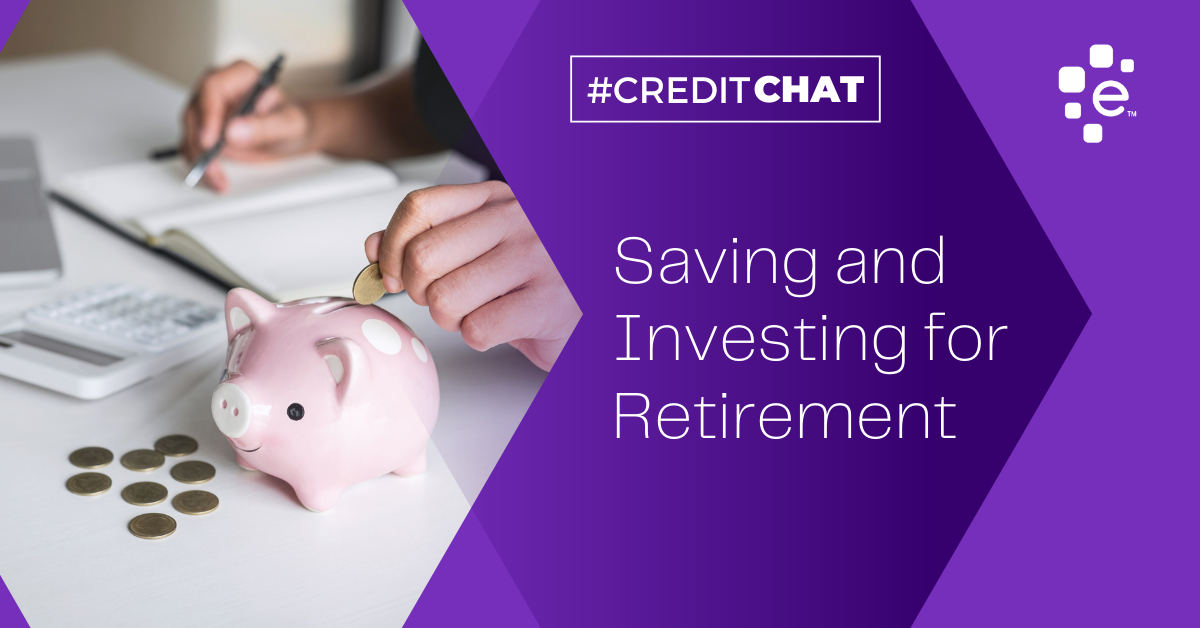Saving and Investing for Retirement

Join our #CreditChat on Twitter every Wednesday at 3 p.m. ET.
The panel included Rod Griffin: Senior Director, Consumer Education and Advocacy, Experian; Christina Roman: Consumer Education and Advocacy Manager at Experian; Beverly Harzog: Credit Card Expert and Consumer Finance Analyst for U.S. News; Paulina Likos: Investing Reporter at U.S. News; and Alicia R. Hudnett Reiss: CERTIFIED FINANCIAL PLANNER™.
Questions We Discussed:
Q1: When should you start saving for retirement?
Q2: What are some ways to create a successful savings plan?
Q3: What percentage of your income should go to savings?
Q4: Should you pay off debt before you invest?
Q5: How do you decide whether or save or invest?
Q6: How much should you save for retirement?
Q7: Should you max out your 401(k)?
Q8: How do you save for retirement without a 401(k)?
Q9: What are some common investing mistakes to avoid?
Q10: Any final tips on saving and investing for retirement?
Retweet these insights from our community:
A1: The best asset an investor has is time. The sooner you start investing for retirement the longer your time horizon which means the longer your investments have to grow. This is why making retirement a priority is important in your early stages in life. #creditchat
— Paulina Likos (@Paulina_Likos) September 9, 2020
A2: To be as tax-efficient as possible. Begin with saving in your employer’s retirement plan & automate deductions and making sure you’re taking advantage of any match; then set up outside retirement accounts, again with automatic deductions from your checking account #creditchat
— Mina Ennin Black (@wealthwithmina) September 9, 2020
A3: Putting 20% of your income each month into savings is ideal, but isn’t always realistic. Aim for 10% at the minimum to 15% if 20% is too much! Any amount is better than putting nothing away. #CreditChat
— Leslie H. Tayne, Esq (@LeslieHTayneEsq) September 9, 2020
A4. It may seem counterproductive to set any amount of money aside when you are working your way out of debt. However, if you can save even just a small percentage of your check, it may be help to prevent you from going further debt in the future. #creditchat
— Christina Roman (@Teena_LaRo) September 9, 2020
A5: Money management can be a complex task. If you don’t have savings, investing shouldn’t be on your radar. In this case, focus on securing your money. If you’re in the position to enhance your wealth, long-term investing is a path toward attaining financial growth. #CreditChat
— Paulina Likos (@Paulina_Likos) September 9, 2020
A6: It’s a great idea to have enough saved for retirement where you’re “making” 80% of your current salary while retired. This can come out to 10-15% of your annual income, depending on how long you’ve been saving & other factors. #CreditChat
— Leslie H. Tayne, Esq (@LeslieHTayneEsq) September 9, 2020
A7. You should at least defer enough to get your full 401(k) match from your employer, otherwise you are leaving “free” money on the table.
Maxing out really depends on your income level and should be part of an overall plan. #CreditChat— Larry Sprung, CFP® (@Lawrence_Sprung) September 9, 2020
A8: For those who don’t have access to a 401k plan through their employer, eligible taxpayers can contribute to a ROTH IRA or a traditional IRA where you can contribute up to $6,000 or if you’re 50+ up to $7,000. Anyone who earns income can open this account. #CreditChat
— Paulina Likos (@Paulina_Likos) September 9, 2020
A9: A common investing mistake is waiting too long to start. The whole point of investing is that you give your money time to grow with compound interest. #CreditChat pic.twitter.com/PsPgF3HnY3
— American Consumer Credit Counseling (@ACCC_TalkCents) September 9, 2020
A10: Diversify your investments. Don’t put all your eggs in one basket! It’s a good idea to own stock in several different companies or industries, not just one. #CreditChat
— American Consumer Credit Counseling (@ACCC_TalkCents) September 9, 2020